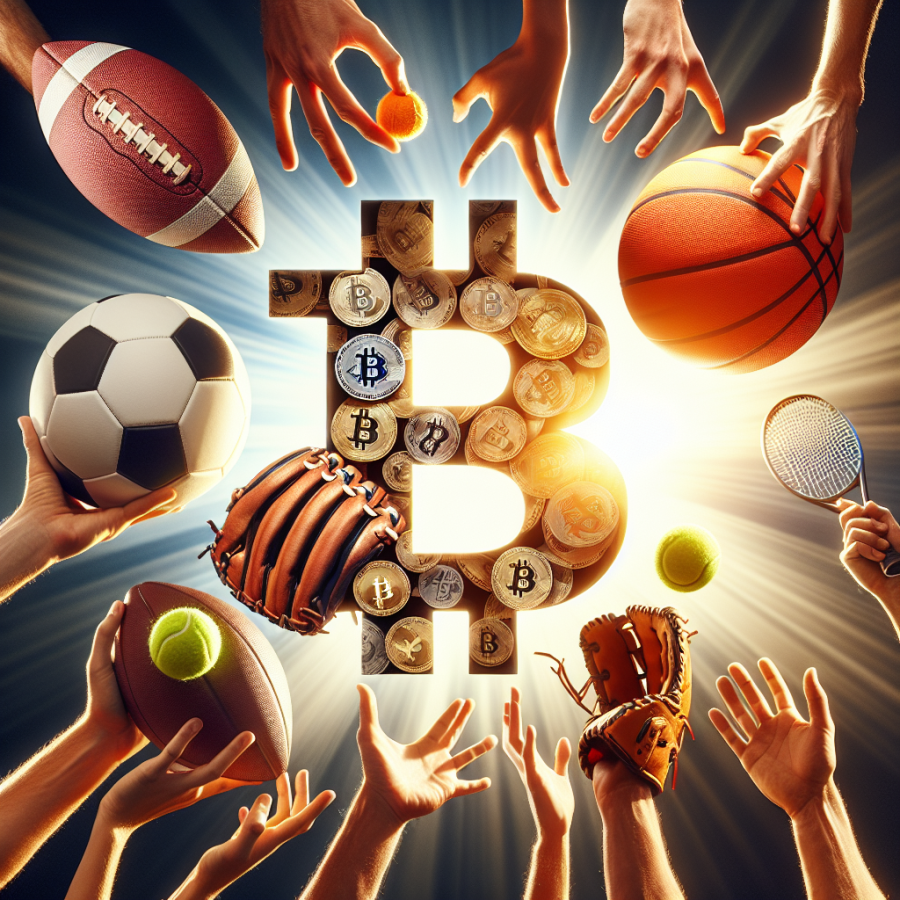Game Changer: How Cryptocurrency is Transforming Sports Sponsorship and Merchandising
In recent years, the fusion of sports with cutting-edge technology has given rise to a novel trend that influences both sponsorship and merchandising—a symbiosis that has the potential to reshape the landscape of sports marketing. At its core lies cryptocurrency, a tool that is proving to be a game changer for sports franchises and athletes alike.
Sponsorship has long been the financial bedrock for professional sports teams. Typically, a partnership with a major brand would involve cash transactions and some mutual promotion. However, with the advent of cryptocurrency and the blockchain technology that underpins it, the nature of these relationships is evolving. Crypto-based companies are beginning to funnel investment into sports teams via sponsorship deals. In exchange, these sponsorships are not just providing capital; they are also opening avenues for fan engagement and creating new layers of fan loyalty. For instance, sports teams are now offering exclusive fan experiences and merchandise that can be purchased only with the team's partnered cryptocurrency. This not only drives up the value and demand for the currency itself but also initiates fans into the cryptocurrency ecosystem.
Merchandising, meanwhile, is becoming more innovative with digital collectibles, such as non-fungible tokens (NFTs), taking the industry by storm. Fans can now own a piece of their favorite team or athlete's legacy through blockchain-certified memorabilia. From limited edition digital jerseys to game-winning moment tokens, these NFTs offer more than just ownership; they represent a new-age form of memorabilia that has the potential to appreciate in value. This digital scarcity and uniqueness are creating a flourishing market for sports-related NFTs, enabling fans to speculate, trade, and invest in a way previously inconceivable.
Moreover, smart contracts on the blockchain allow for the direct and transparent flow of royalties back to the teams and athletes whenever their NFTs are resold. This not only ensures ongoing revenue from secondary sales but also strengthens the bond between the sport entities and their fan base by offering a perpetual stake in the success and popularity of the merchandise.
Tokenization has also facilitated the advent of fan tokens, revolutionizing fan engagement in sports. Fans can purchase these tokens to participate in various team-related decisions, from choosing jersey designs to selecting charity initiatives. Thus, token holders become more than just supporters; they become active stakeholders in their teams' decisions, reflecting a radical shift towards a more democratic and participant-oriented sporting ecosystem.
However, the integration of cryptocurrency into sports sponsorship and merchandising is not without its challenges.
Read also:
Mastering the Thrill: The Ultimate Inline Skating Guide
Revolutionizing Sports Funding: The Emergence of Fan Tokens
The world of sports is undergoing a paradigm shift with the emergence of fan tokens, a new form of cryptocurrency that has the potential to completely overhaul traditional sports funding models. These digital assets represent a dynamic and interactive way for fans to connect with their favorite teams and athletes, impacting the sporting ecosystem on multiple levels.
Fan tokens are a type of utility token, functioning within the ecosystem of a specific sports team or organization. They are often created and distributed through partnerships with blockchain firms that specialize in the sports market. These tokens can offer a variety of benefits and applications for both the fans and the sports entities. From a fan perspective, holding these tokens can grant voting rights on minor decisions related to their teams, such as choosing uniform designs, match locations, or even selecting charity initiatives. Fans may also access exclusive rewards, like meet-and-greets, signed merchandise, or unique experiences that are not available to the general public.
For sports organizations, fan tokens open up a new revenue stream. By tokenizing the fan experience, clubs can engage a global audience, offering them a stake in specific decisions without compromising overall control. This method of funding allows for a more democratized approach to team decisions, as it's the fans—now also investors or stakeholders—who can have a say, albeit limited, in certain aspects of their favorite club's operations.
The economic model of fan tokens is not based on passive ownership but rather on active engagement. As fans interact more with their team's events and platforms, the value of their tokens could potentially increase. This creates a vibrant secondary market for tokens, with price fluctuations based on current team performance, special events, or announcements, similar to traditional stocks.
Fan tokens also carry the potential to revolutionize sports funding beyond single teams or organizations. They could potentially be used for large-scale funding of sporting events or infrastructure, allowing fans around the world to invest in the development of new stadiums or support a city's bid for hosting a major international event.
Moreover, this innovative funding strategy helps teams cultivate a closer relationship with their fan base. It allows fans to feel more invested in their team's successes and failures beyond the emotional aspect, as there is now a financial stake involved. This increased engagement fosters a more profound sense of community and loyalty, which can positively affect team brand values and long-term fan-base growth.
However, the introduction of fan tokens also brings challenges and concerns, particularly regarding the regulatory landscape of cryptocurrencies and the potential for market manipulation.




